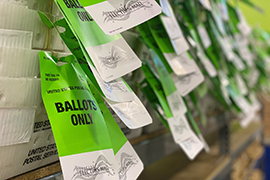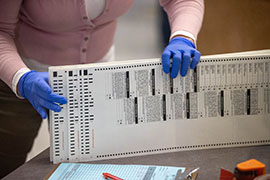- Slug: BC-CNS-Petitions Pandemic,840 words.
- 2 file photos available (thumbnails, captions below)
By Martin Dreyfuss
Cronkite News
PHOENIX – One expert thinks it’s evidence of voter enthusiasm. Another thinks it is more likely caused by voter unhappiness with their elected officials.
What they’re referring to is the avalanche of statewide ballot questions that Arizona voters are likely to face when they go to the polls this fall.
There are already four initiatives on the ballot and another 15 that have been filed with the Arizona Secretary of States’ office and will be added if supporters can collect enough signatures. That does not include resolutions currently working their way through the Legislature that, if passed, would land on this fall’s ballot as referendums.
It is likely to surpass the 10 initiatives that were on the ballot in 2022, and has the potential to break the record of 19 ballot questions from 2006. In most other years, experts say, Arizona voters can expect to face only a handful of issues on the ballot.
James Strickland, a political science professor in Arizona State University’s School of Politics and Global Studies, said Arizona voters this year are approaching the high number of initiatives and referendums typically seen on ballots in more liberal states.
“Usually, the states with the most questions on the ballot tend to be Oregon and California, and it is not uncommon to see 10 to 12,” said Strickland, a longtime Michigan resident. “In Michigan, I don’t think there were that many questions on the ballot. The last election I voted for in Michigan was 2018, and I think there were two or three ballot items.”
In Arizona, legislators can put referendums on the ballot that ask voters to approve laws or amend the Arizona Constitution. Citizens can put initiatives on the ballot – if they can collect enough signatures from other voters.
Already on the ballot for this fall are referendums that would require partisan primary elections, limit the governor’s emergency powers and toughen signature requirements for citizens seeking to put initiatives on future ballots.
Still in the signature-gathering stage are proposals to guarantee abortion access, raise the minimum wage and do away with tipped wages, require open primaries, and make psychedelic mushrooms legal for medicinal use – along with longer-shot efforts to recall specific lawmakers. A proposal that would have recalled Gov. Katie Hobbs already failed to collect enough signatures by its deadline to get on the ballot.
Even more are in the pipeline: Of the scores of proposed referendums introduced in this year’s Legislature, proposals that are still alive include plans to require proof of citizenship for work or to collect public benefits, prohibit state investments in companies that engage in diversity, equity and inclusion, or DEI, programs, and regulate teacher pay.
JP Martin, the communications director for the Arizona Secretary of State’s office, attributes the increased number of initiatives to an “uptick” in interest across various parties.
“This enthusiasm translates into a higher number of votes cast,” Martin said.
But Sherri Greenberg thinks there may be other motivations behind the potentially large number of citizen-driven ballot initiatives: Voters are taking matters into their own hands.
“Yes, if you have a situation where people feel nothing is happening, and they are not getting what they want, then they may go to an initiative,” Greenberg said.
Whatever is behind the surge, Greenberg and others agree that it brings the potential for “voter roll-off,” where overwhelmed voters give up before reaching the bottom of their ballots.
“Long ballots can create fatigue and roll-off, but it depends on if it is something they are engaged in,” Greenberg said.
According to roll-off theory, one in four voters will ignore initiatives and referendums, leaving decisions in the hands of a small minority.
Stephen Nichols, a political science professor at California State University, San Marcos, wrote in a 1998 article that many voters “simply fail to record a preference in initiative and referenda contests. … The problem of roll-off is especially acute for referenda, which are put on the ballot by state legislatures.”
Strickland said another factor in roll-off in Arizona is the fact that initiatives and referendums are usually put at the end of the ballot. Arizonans are likely to skip the majority of questions that do not affect them.
“Here in Arizona, any ballot question tends to be at the very bottom of the ballot. Local questions tend to be dominated by people who strongly care,” he said.
But University of Arizona political scientist Tom Volgy said that Arizona voters take the power of the initiative seriously.
“The public understands that this is their opportunity,” Volgy said, “In my experience, you do not even have to be enthusiastic. Most voters do their homework.”
He believes the increase in ballot initiatives is caused by a “growing disenchantment with the route the state Legislature has taken.”
“It means a lot. It transcends to the broad perspective of the public not being happy with public policy,” Volgy said. “I am not sure if it is a lot worse. What is worse is the incredible partisanship and polarization in society.”
For more stories from Cronkite News, visit cronkitenews.azpbs.org.
^__=
Web links:
_ Pending initiatives: https://apps.arizona.vote/electioninfo/IRR/47
_ AZSOS on ballot measures: https://azsos.gov/elections/ballot-measures
_ Historical ballots: https://azsos.gov/elections/results-data/voter-registration-statistics/historical-election-results-information
_ Nichols article: https://journals.sagepub.com/doi/abs/10.1177/0160323X9803000203
^__=
State election officials have already approved four ballot questions for this fall’s election, and another 15 have been filed with the Arizona Secretary of States’ office with more yet proposed by the Legislature. If they are all approved, it could top the 2006 record of 19 questions on the ballot. (Photo courtesy Maricopa County Elections Department)
In a typical election, voters may face a handful statewide questions on the ballot, but the 2024 election could be the second in a row with ballot questions in the double digits. (File photo by Drake Presto/Cronkite News)

